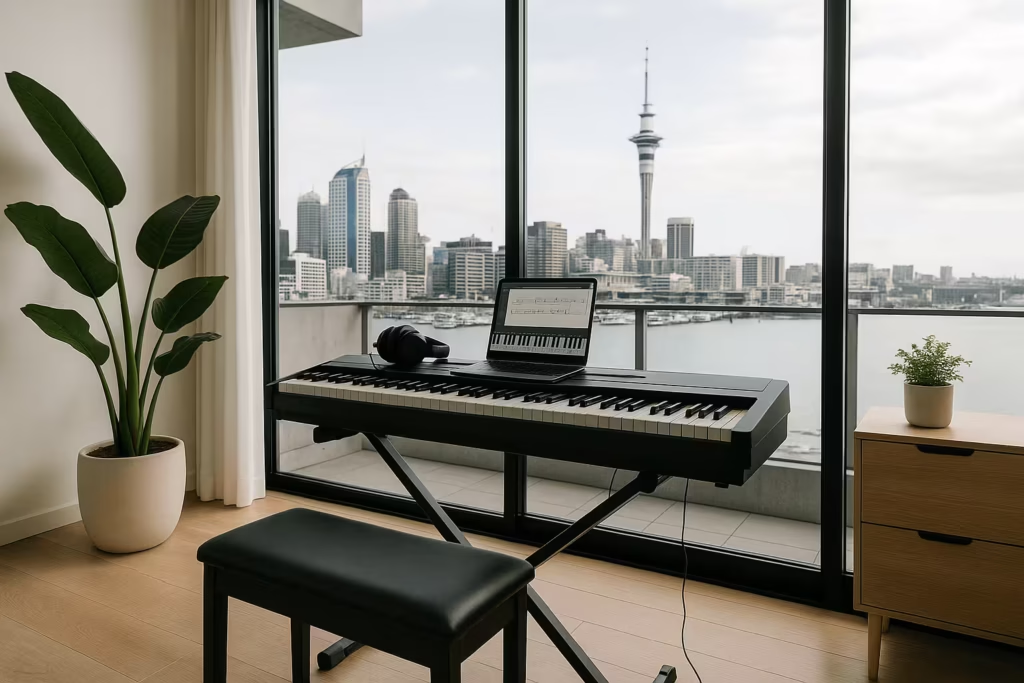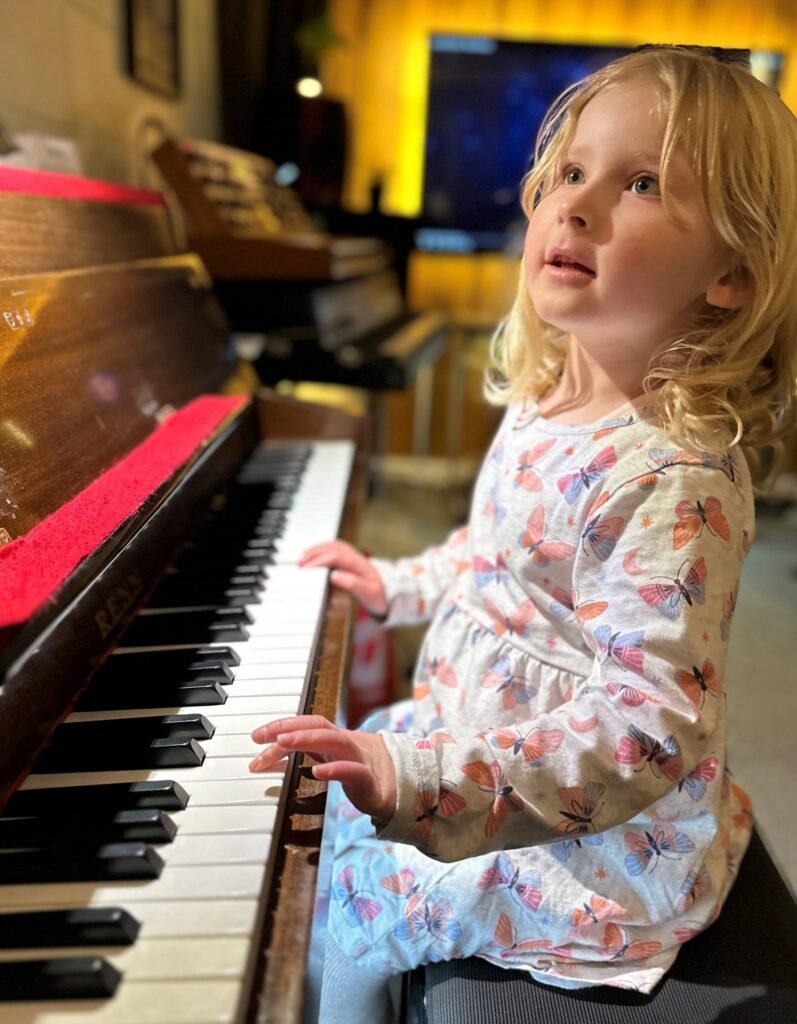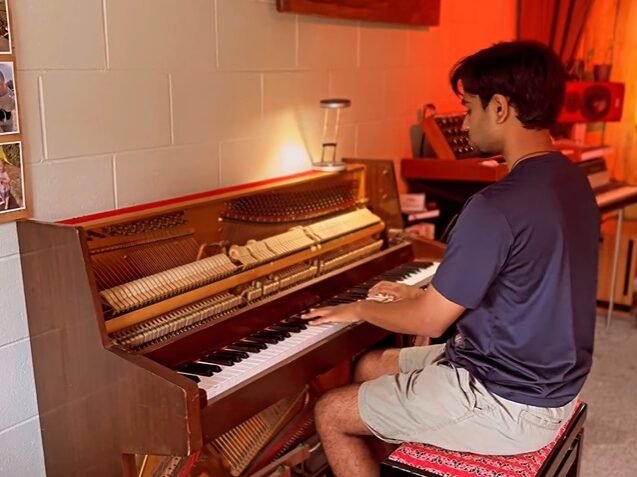Learning how to teach yourself piano can be a deeply rewarding journey. This guide outlines essential steps and considerations for all aspiring pianists, making self-study not only feasible but also enjoyable.
- Introduction
- Choosing the Right Equipment
- Effective Practice Methods Without Formal Instruction
- Why Choose Timothy William for Learning Piano
- Frequently Asked Questions
- Can anyone learn to play the piano on their own?
- How long does it typically take to become proficient?
- Do I need a traditional piano, or is a keyboard sufficient?
- What are some effective practice routines for beginners?
- Are there particular online resources you recommend?
- How can I maintain motivation while learning on my own?
- How important is reading sheet music?
- What should I do if I experience challenges while learning?
Learning how to teach yourself piano is an empowering and fulfilling journey that opens up a world of musical possibilities. Whether you’re a beginner with zero experience or someone looking to refine your skills, this guide will provide you with the foundational steps necessary to embark on your musical adventure. Having a structured plan is crucial to success, and that’s what we aim to offer in these subsequent sections.
Getting Started with Self-Study
When taking the first steps in your piano learning journey, understanding the basics is essential. Familiarising yourself with the keyboard layout, learning proper hand positioning, and exploring beginner exercises are vital starting points. Additionally, building a routine that includes regular practice can solidify these foundations. As a resident of Auckland, New Zealand, you might find inspiration in local music events or community gatherings that can augment your learning experience.
Setting Realistic Goals
Setting realistic goals is a cornerstone of learning any new skill, and piano is no exception. Start by determining what you want to achieve, be it mastering a simple tune or preparing for a local recital. Goals provide direction and motivate you to remain consistent in your practice. Timothy William, a prominent piano teacher in Auckland, suggests breaking down complex pieces into manageable segments, allowing you to gradually build up your expertise and confidence.
Exploring Online Resources
In today’s digital era, numerous online resources are available to guide your self-study. Platforms offering tutorials, sheet music, and practice tools can be incredibly beneficial. Evaluating and selecting reliable resources will ensure you gain quality instruction and support as you learn. Embrace these digital tools as companions on your piano-learning journey, and integrate them to enhance your traditional practice methods.
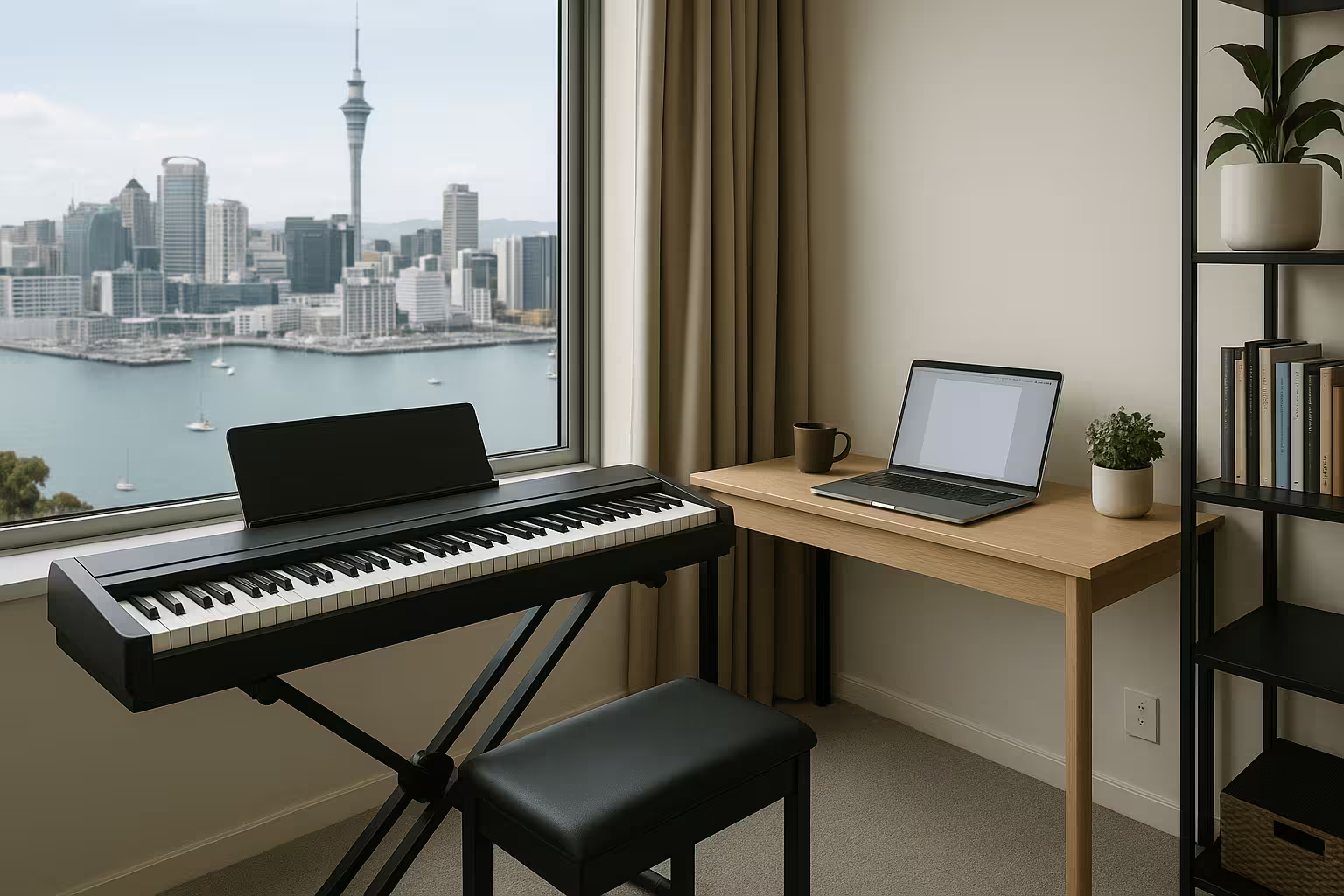
Choosing the Right Equipment
Embarking on the journey to teach yourself piano requires not just dedication and technique, but also the right equipment that suits your personal needs and environment. The right tools can significantly impact your learning process, making it enjoyable and effective. This section delves into the various equipment options and how to select the best fit for you, whether you’re a complete beginner or at an intermediate level.
Acoustic vs Digital Pianos
One of the first decisions you’ll face is whether to invest in an acoustic or digital piano. Acoustic pianos, with their rich, warm sound, are the traditional choice. They provide the tactile response and dynamic range that can be invaluable for developing technique and expression. However, they can be expensive and require regular maintenance, including tuning.
Digital pianos, on the other hand, are a more modern option with several advantages for the self-learner. They offer a wide range of features like volume control, headphone compatibility, and varied instrument sounds. Some models even provide interactive learning modes and connectivity to apps and online resources—making them a versatile choice for beginners. Additionally, they are generally more affordable and require less maintenance than their acoustic counterparts.
Understanding Key Features
When selecting a piano, understanding key features is crucial. Weighted keys are significant for replicating the feel of an acoustic piano, which helps strengthen your fingers and technique. Touch sensitivity is another feature that allows dynamic expression by responding to different levels of pressure on the keys, akin to an acoustic piano’s response.
Polyphony, the number of notes a piano can produce at once, is another vital feature, especially as you advance to playing more complex pieces. Look for a piano with at least 64-note polyphony for a seamless playing experience. Additionally, connectivity features like USB or MIDI ports can enhance your learning by allowing integration with educational software and apps, which can be particularly beneficial when teaching yourself piano in Auckland, New Zealand.
Buying versus Renting Equipment
For those just starting out, the decision between buying or renting is an important consideration. Renting can be a cost-effective option for beginners who are unsure about making a long-term commitment. It allows you to explore different types of pianos without the pressure of a hefty initial investment.
However, if you are committed and foresee regular practice, owning a piano makes more sense in the long run. It offers consistency in your practice environment, helping solidify your learning habit. Moreover, purchasing from reputable suppliers in Auckland ensures quality and potentially better support services, should you need technical assistance or maintenance advice.
Having explored the importance of choosing the right equipment for your self-directed piano learning journey, it becomes clear that the right tools can make a significant difference in your progress and enjoyment. In the following section, we will discuss effective practice methods and strategies to maximize your learning potential without formal instruction.
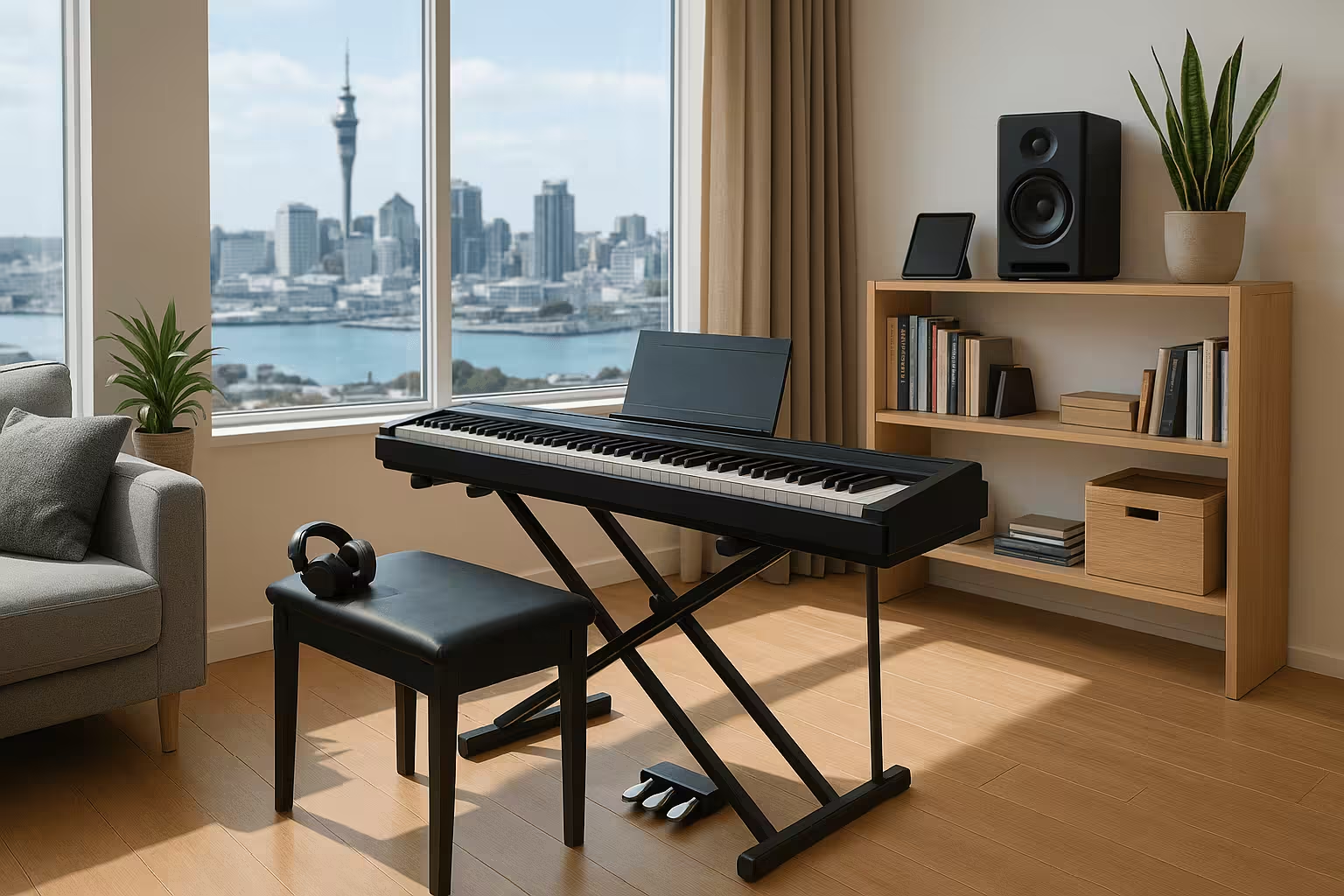
Effective Practice Methods Without Formal Instruction
Embarking on the journey of learning piano autonomously presents a unique set of challenges and advantages. In this section, we will delve into practical methods that enhance your self-study experience and maximize efficiency.
Setting Realistic Goals
Establishing clear and attainable goals is crucial when teaching yourself piano. Begin by identifying the level of proficiency you aim for in a specific timeframe, allowing you to measure progress effectively. Whether you aspire to play a simple tune or master a complex composition, setting a series of incremental milestones helps maintain motivation and guide your practice sessions.
It’s important to be flexible with these goals as you may need to adjust them based on your progress or unforeseen challenges. This adaptability not only prevents frustration but ensures continued engagement with your learning process.
Using Structured Practice Sessions
Structured practice sessions encourage discipline and efficiency. Start each session by warming up with scales and arpeggios to improve finger strength and agility. Then, focus on a specific piece or technique that aligns with your current skill level. Dedicate time to both slow, deliberate practice for muscle memory development and faster-paced exercises to enhance reflexes.
Ensure each session concludes with a brief review to assess areas of improvement and plan subsequent practices. This approach cultivates a habit of reflective learning, essential for long-term success.
Leveraging Technology
In today’s digital age, technology plays an invaluable role in self-teaching piano. Utilize online resources such as instructional videos, online courses, and apps tailored to piano learning. These platforms often provide interactive interfaces and engaging tutorials that can mimic the experience of having a personal instructor.
Additionally, consider using digital tools that offer feedback on your playing tempo and accuracy. This instant feedback mechanism aids in correcting mistakes promptly, enhancing overall skill acquisition.
Joining Communities
Participating in online piano communities offers a sense of camaraderie and support. These platforms are valuable for sharing experiences, seeking advice, and celebrating milestones with fellow learners. Engaging with others also opens up opportunities to access diverse materials and insights that can enrich your learning path.
Whether through social media groups, forums, or local events in Auckland, these communities are excellent resources to establish connections and continually motivate yourself on your musical journey.
By adopting these effective practice methods, you can accelerate learning while enjoying the creative process of music-making. As you embrace these strategies, you’ll find ample opportunity to refine your skills and expand your repertoire, even without formal instruction.
Why Choose Timothy William for Learning Piano
When embarking on the journey of self-teaching piano, having the right guidance can make a substantial difference. Timothy William, located in the vibrant city of Auckland, New Zealand, brings unmatched expertise and a passion for music education that sets him apart. As a leading piano teacher, Timothy offers personalized guidance tailored to individual learning styles, ensuring each student progresses confidently and effectively.
Experienced Local Experts
Timothy William is anchored firmly in Auckland and offers his deep local insight into the music scene, making him a trusted resource for aspiring pianists. With years of teaching experience, he has honed his skills to provide instruction that resonates with both beginners and advanced learners. Tim’s approach is all about nurturing talent and fostering a love for music, which is integral to successful self-teaching.
Additionally, being based in Auckland enables Timothy to offer a unique perspective on the diverse musical influences in the area, which enriches the learning experience. Many students have praised his ability to connect real-world music events and traditions directly to their piano practice, creating a more immersive and inspiring educational environment. To explore how an Auckland piano teacher can enhance your learning journey, contact Timothy William today – based in Sandringham.
What Sets Us Apart
Several key qualities distinguish Timothy William from other instructors, making him the preferred choice for aspiring pianists. His personalized learning plans cater to individual needs, ensuring that each student receives a bespoke programme designed to meet their goals. Furthermore, his reputation for patience and understanding makes him a favourite among learners of all ages, as he adeptly addresses areas of difficulty with tailored strategies and solutions.
Timothy also ensures a holistic teaching approach, incorporating music theory and practical knowledge that aids students in learning how to teach yourself piano efficiently. His commitment to ongoing professional development allows him to integrate the latest teaching techniques and resources, providing his students with the most modern and effective methods available.
For more detailed insights, including the specific curriculum and approach Timothy uses, consider visiting the detailed section on his piano lessons in Auckland. Trust in Timothy William isn’t just built through his credibility but through the relentless pursuit of excellence in all his teachings. If you’re eager to start or refine your piano learning journey, his services offer exactly what you need.
In the next section, we will address some of the most frequently asked questions concerning how to teach yourself piano. These insights are designed to demystify common concerns and provide additional guidance to ensure a successful and rewarding learning outcome.
Frequently Asked Questions
Can anyone learn to play the piano on their own?
Absolutely! With dedication, consistent practice, and the right resources, anyone can learn to play the piano independently. Many successful pianists are self-taught.
How long does it typically take to become proficient?
The time it takes to become proficient varies depending on practice frequency and individual goals. On average, regular practice over several months can lead to basic proficiency.
Do I need a traditional piano, or is a keyboard sufficient?
While a traditional piano is ideal for learning, a good quality keyboard with weighted keys can be an excellent alternative, especially if space or budget is limited.
What are some effective practice routines for beginners?
Beginners should focus on regular, short practice sessions emphasizing scales, hand coordination, and simple pieces to build foundational skills gradually.
Are there particular online resources you recommend?
There are numerous online resources, such as video tutorials, piano learning apps, and instructional books that can guide your learning process effectively.
How can I maintain motivation while learning on my own?
Setting realistic goals, celebrating small achievements, and playing music you enjoy can significantly boost motivation during your self-learning piano journey.
How important is reading sheet music?
Reading sheet music is a valuable skill that allows you to play a wide range of pieces. However, it’s possible to learn songs by ear as well, which can complement your overall learning.
What should I do if I experience challenges while learning?
It’s normal to face challenges. If you encounter difficulties, try to reassess your practice methods, seek guidance from online forums, or consider occasional lessons with a teacher in Auckland.

